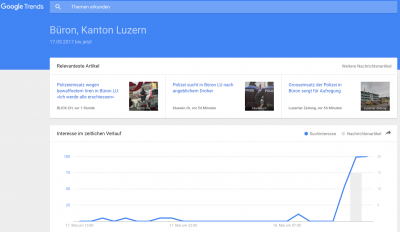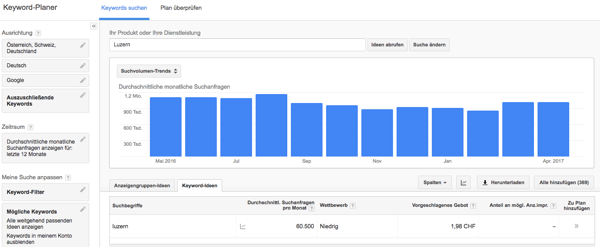"Content is king." But what would this truism of content, online and search marketing be without relevant keywords? Relevant keywords are a must in order to ensure visibility on search engines. A good search engine ranking depends on, among other things, high-quality texts with relevant keywords. Only relying on image or video content without informative text-based content is the wrong way to go.
But be careful! There are many different ways to approach your keywords research. The keyword tool you use can be a crucial factor. The focus of the individual tools is often on different aspects such as trends, competition or versatility. We have identified three types of tools:
Category 1: Versatile tools
These types of keyword tools include, for example, the Google Keyword Planner or the Wordstreams Free Keyword Tool. Both are well-suited for a more general keyword research. The tools make it easy to filter keywords with a good search volume in relation to the lowest possible competition.
The Google Keyword Planner is mainly for advertisers. It combines the functions of the old and now deactivated Google keyword tool with those of the Traffic Estimator. Even inexperienced users can get started rather easily and create campaigns within the tool. The Google Keyword Planner gathers insights about search volumes from different devices (computers, tablets and mobile phones). The only drawback is that the tool is fee-based and requires registration with Google AdWords.
The Wordstreams Free keyword tool is available free of charge. It also allows users to find good keyword suggestions. The first 10 search queries are free. After the first ten queries, access is restricted to one per day unless users register for premium access.
Category 2: Trend Tools
One trend chases the next. Hence it is not surprising that search engine optimization is increasingly dependent on currently popular keywords.
The Google Trend Tool provides a good search base when looking for trend keywords as it allows users to track a trend through search traffic. Users quickly and easily generate diagrams to get a good overview of search histories, recent developments and trends. This visualization makes it possible to better assess if the use of a given keyword is worthwhile or whether it is already in decline.

Source: Google Trend https://trends.google.de/trends/
Category 3: Competition-based tools
Higher, faster, further and better is the motto of many companies. Anyone who wants to stay ahead must know what the competition is doing.
Alexa's keyword tool helps you to learn about the competition's keywords. This knowledge can be used to differentiate your brand from competitors and to develop your own innovative strategy.
The Google Keyword Planner can also be used for this purpose. However, this tool only provides the degree to which the keyword is used - low, medium, or high.
Conclusion: It is best to research keywords with several tools and to compare the results.
Content is King - but only with the right keywords!










